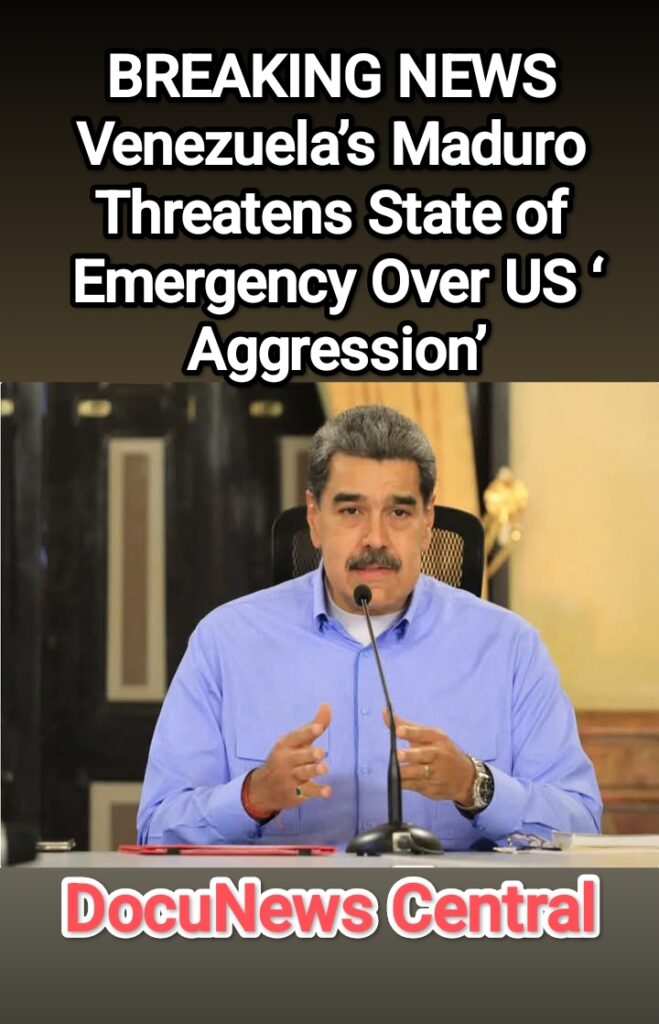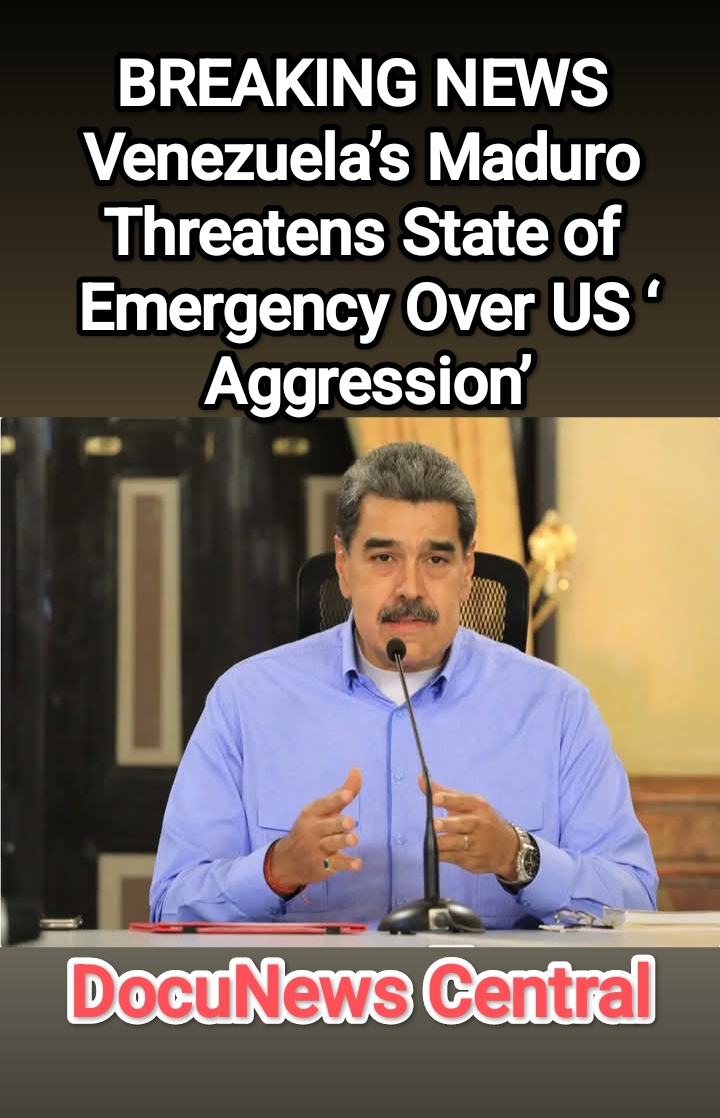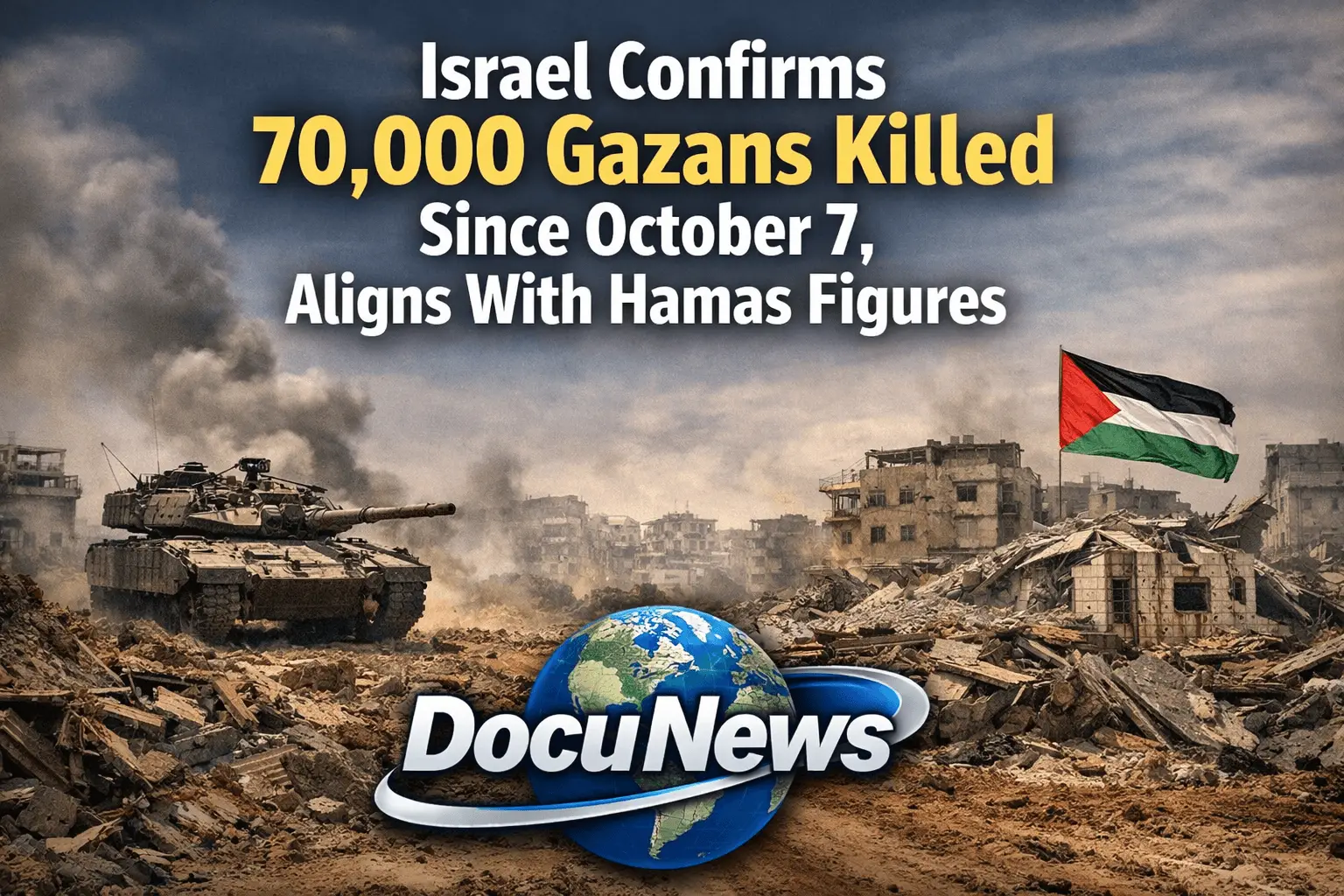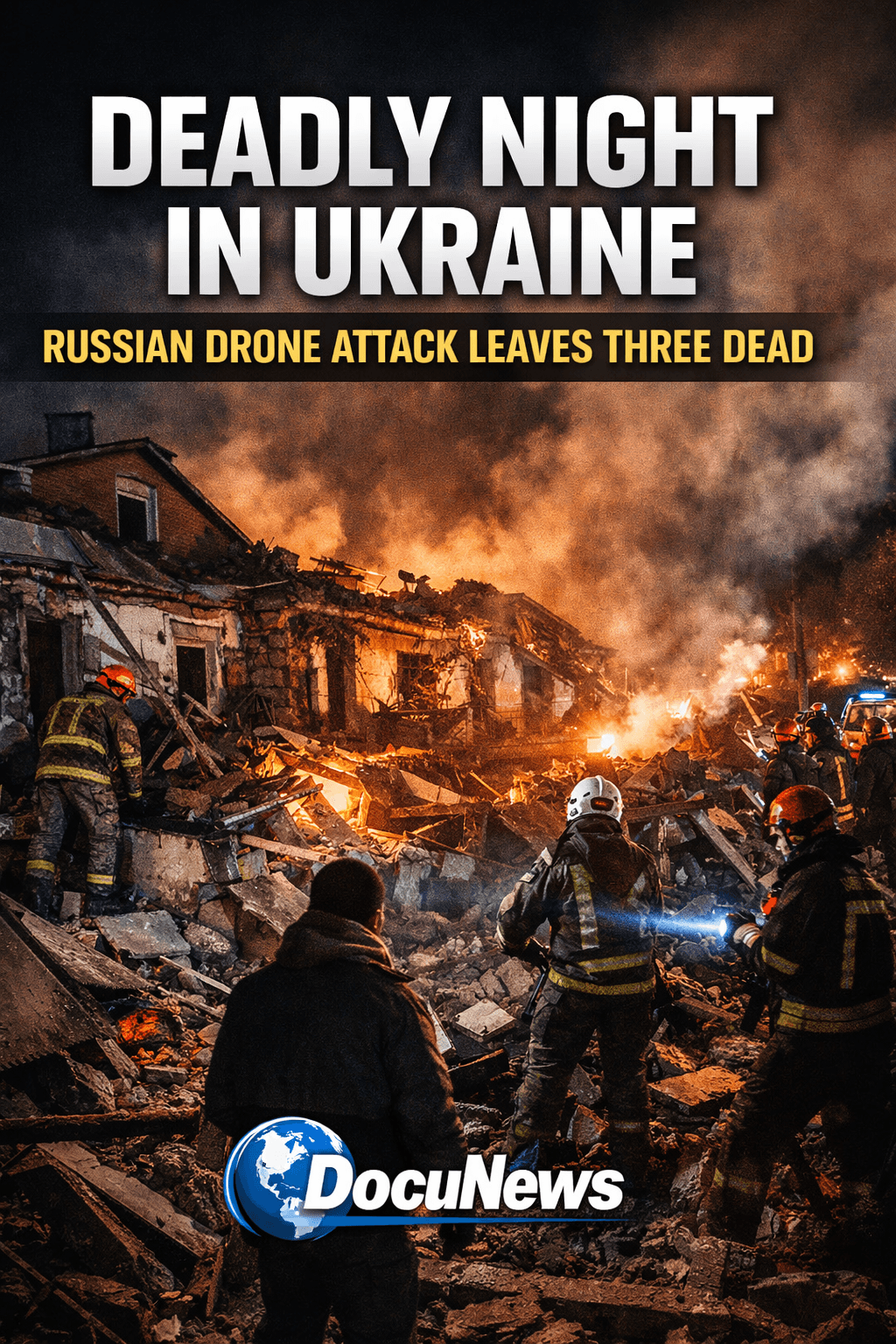
Venezuela’s Maduro Threatens State of Emergency Over US ‘Aggression’
Caracas, Venezuela – Venezuela is on edge as President Nicolás Maduro says he is ready to declare a state of emergency in the country. He made this statement on Monday after a wave of deadly U.S. strikes on boats that Washington claimed were used for drug runs. The tension has sparked fears of a wider conflict in the region.
This move, if carried out, would grant the government special powers and could shift the balance of life inside the oil-rich nation. The announcement has already stirred reactions across Latin America and beyond. read also Enugu woman dies in Accident because no doctor was available docunewscentral.com
Maduro Sounds the Alarm
President Maduro addressed the country in a televised speech. He accused the United States of aggression and warned that Venezuela would not sit back and watch. His words carried urgency and defiance.
Maduro said that he has signed a decree that could put Venezuela under a state of emergency if U.S. attacks continue. He claimed that Venezuela’s sovereignty is under threat. According to him, the strikes on the boats are just the start of a bigger plan by Washington.
Decree Signed But Not Yet Active
Vice President Delcy Rodríguez showed the decree on live television. She explained that it gives the military power over vital services and energy production in case of a direct attack.
The document is valid for ninety days. It can also be extended if needed. For now, the decree has not been enforced nationwide. But the government says it is ready to activate it at any moment if Washington does not back down.
US Strikes Spark Outrage
The latest clash began after reports of U.S. strikes on Venezuelan vessels in the Caribbean Sea. Washington said the boats were linked to drug cartels and were carrying illegal shipments. The U.S. claims it acted under international law.
But Caracas strongly disagreed. Officials said the boats were civilian and accused Washington of violating Venezuela’s sovereignty. State media reported several deaths and injuries from the strikes. This version of events could not be fully verified, but the news has fueled anger inside the country.
Maduro Calls It “Imperial Attack”
Maduro used strong language to describe the events. He called the strikes “acts of war” and accused the United States of trying to destabilize his government.
He insisted that Venezuela is a peaceful nation but will defend itself if attacked. He also urged allies in Latin America and beyond to stand with his country.
Regional Concerns Grow
Neighboring nations are watching the crisis closely. Colombia, Brazil, and other South American states have expressed concern about a possible military escalation.
The Organization of American States (OAS) has called for calm. Its officials urged both sides to avoid steps that could trigger a regional conflict.
Leaders in the Caribbean are also uneasy. Many fear that an armed clash between the U.S. and Venezuela could disrupt trade and security in the region.
International Reactions
Global powers are also weighing in. Russia and China, two allies of Venezuela, criticized the U.S. actions. They said Washington has no right to use force in the Caribbean.
The European Union called for restraint. EU leaders urged dialogue instead of escalation. They warned that war would only bring more suffering to ordinary Venezuelans.
The United Nations expressed deep concern. A UN spokesperson said the body is ready to mediate if both sides agree.
Venezuelan People Brace for Uncertainty
Inside Venezuela, the news has stirred anxiety. Citizens are facing the risk of tighter military control if the emergency decree is enforced.
Some fear shortages of food and fuel. Others worry about curfews and restrictions on daily life. Already, Venezuela has been struggling with economic crisis, high inflation, and shortages.
For many, the threat of an emergency only adds to their burden. Yet some citizens say they support Maduro’s stance. They believe Venezuela must resist what they see as U.S. interference.
What the State of Emergency Means
If Maduro activates the decree, the military would gain expanded powers. These include control over oil fields, public utilities, and transportation.
The state could also restrict protests and increase surveillance. Critics warn this may reduce freedoms and silence opposition.
Supporters argue that the decree is needed to protect the nation in case of war.
Opposition Voices Concern
The Venezuelan opposition is divided on the issue. Some leaders said the U.S. strikes are dangerous and risk dragging the region into conflict.
Others accused Maduro of using the crisis to strengthen his grip on power. They warned that a state of emergency could be used to suppress dissent.
Opposition figures also called on the international community to pressure both Washington and Caracas to de-escalate.
Washington’s Position
U.S. officials defended the strikes. They argued that the boats targeted were part of drug networks that threaten global security.
The White House said it has no plans for a wider war with Venezuela. But it added that it will continue to act against what it calls “narco-trafficking operations.”
U.S. officials also warned Maduro not to “use this incident as an excuse to crack down on his people.”
Analysts Warn of Escalation
Experts say the situation could spiral if both sides refuse to step back. They note that U.S. forces in the Caribbean are strong and could easily overpower Venezuela.
However, analysts also point out that a war would be costly for Washington. They warn that it could destabilize the region and draw in other global players.
Many stress that dialogue is the only way out of the crisis.
Possible Scenarios
There are several paths ahead.
- Diplomatic Talks – If both sides agree to talks, tensions may ease. The UN or regional bodies could play a key role in mediation.
- Activation of Emergency Rule – Maduro could declare the state of emergency soon, giving the military sweeping powers.
- More Strikes – If the U.S. continues its attacks, clashes could intensify, raising the risk of open conflict.
- Regional Fallout – Neighboring nations may be drawn in if the crisis grows.
Venezuela’s Military Prepared
The Venezuelan military has staged drills in recent days. State TV showed tanks, missiles, and fighter jets on display.
Generals pledged loyalty to Maduro and said they are ready to defend the nation. The military remains one of the president’s main pillars of support.
Critics argue that despite these shows of strength, Venezuela’s armed forces are no match for the U.S. military.
Economic Stakes
Venezuela holds the world’s largest proven oil reserves. Any conflict involving the country could shake global energy markets.
An emergency decree giving the military control of the oil sector could disrupt production. Investors are already nervous.
Oil prices rose slightly after Maduro’s speech, reflecting market jitters over possible supply disruptions.
Humanitarian Concerns
Aid groups worry that the crisis will deepen the hardship faced by Venezuelans. The nation has already seen millions flee in recent years due to economic collapse.
A state of emergency could make conditions worse. Restrictions on movement and trade could cut off supplies to vulnerable communities.
International charities have urged both sides to put civilians first.
Global Implications
The clash between Washington and Caracas could have global consequences.
Russia and China may step up support for Venezuela, challenging U.S. influence in the Americas.
This could turn the crisis into a bigger test of global power rivalry.
Calls for Peace
Despite the fiery words, many voices are calling for calm. Religious leaders, civil groups, and international bodies are urging restraint.
They argue that another war is the last thing the world needs. With conflicts already raging elsewhere, the global community is urging both Washington and Caracas to step back.
The Road Ahead
The next days will be crucial. Maduro may choose to enforce the emergency rule, or he may hold back depending on U.S. actions.
Washington will also face pressure to justify its strikes and avoid further escalation.
Both sides are standing firm, but the risk of miscalculation is high.
Conclusion
Venezuela stands at a crossroads. President Maduro has raised the stakes by threatening a state of emergency. The United States insists its strikes are lawful and aimed at drug cartels.
The world watches closely as the standoff unfolds. Will cooler heads prevail, or will the clash push Venezuela and the region into deeper turmoil?
For now, uncertainty hangs over Caracas and beyond.
this is DocuNews Central Reporting.











